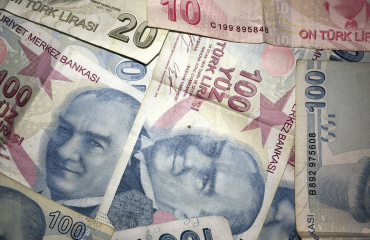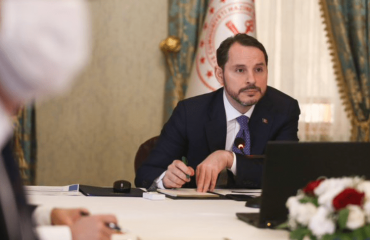The sanctions signed by U.S. President Donald Trump on October 14 concerns Turkish Minister of National Defense Hulusi Akar, Minister of Interior Süleyman Soylu, Minister of Energy Fatih Dönmez, as well as the ministries of Defense and Energy. Furthermore, he has raised the customs tariff on the purchase of steel from Turkey to 50 per cent. He also halted the talks about the plan to boost the trading volume between Turkey and the U.S. from 20 to $100 billion – which nobody was quite sure how that would have gone about in the first place.
Trump justified these sanctions by saying that Turkey had destabilized the region with its Syria campaign; his justification couldn’t have been more hypocritical. Long before Turkey launched this Syria campaign, the Middle East was already the world’s most unstable region. Besides, it had all started with the U.S.’s 1990 Iraq campaign followed by the 2003 invasion of Iraq. And before that, Israeli politics had nearly wiped Palestine off the map, not the mention the U.S., once again, further complicating regional dynamics by backing Saudi Arabia’s lavish oil dictatorship.
The only positive aspect about Trump’s statement is that the U.S. is, at last, questioning its involvement in “endless” wars taking place 10 thousand kilometers away from them.
Sanctions won’t paralyze Ankara but could cause retaliation
First of all, contrary to what U.S. Secretary of Treasure Steven Mnuchin says, these sanctions are quite short of “shutting down” Turkish economy. Besides, Trump is currently using his claims as threats to give a taste of what would come if they cannot reach an agreement with Turkey. The fact that Turkish president Tayyip Erdoğan doesn’t figure in the sanctions list, contrary to Congress demands, shows that the U.S. is still leaving room for maneuver. On the other hand, even if the sanctions won’t paralyze the economy, they will affect the purchase of military material from the U.S. as well as the import of oil and gas from Russia and Iran. The aim of Erdoğan’s interference in the Turkish central bank was to prepare for such sanctions; we’ll see if the preparations will suffice.
Secondly, Turkey is likely to retaliate. The retort would likely be –similarly- symbolic, in the domain of similar sanctions and limitations brought upon members and agencies of Trump Administration, as well as in the military-political realm. For example, the flights of the U.S.’s Syria-bound jets from the Incirlik, Diyarbakır and Batman military bases could be restricted or halted. However, the U.S. said that they will draw back their units from Syria and that the YGP/PKK, who started to cooperate with the Syrian regime; Trump said they “betrayed” the U.S. and can “go their own way”. That’s why such symbolic sanctions on Turkey’s part are similarly unlikely to “paralyze” the U.S.’s regional operations.
Thridly, even though this sanction ordinance is an unacceptable and unjust move against Turkey and gave Trump elbow room, it left Erdoğan some room to maneuver, too. Congress will probably put less pressure on Trump and Erdoğan, due to the sanctions disputes, will likely pay less mind to the pressures on the part of the U.S., the European Union (EU) and the NATO – at least for now. The exception to that would be the fight against ISIS, which, in reality, is a greater concern for Turkey than it is for the West.
Impacts on domestic and regional politics
The fourth point is that the U.S.’s sanctions won’t weaken Erdoğan’s hand in domestic politics: it will strengthen it. We can see that it’s triggered a patriotic sentiment in the Republican People’s Party (CHP) and that party leader Kemal Kılıçdaoğlu is at the forefront of this attitude despite certain resistance from within the party. Aside from the Peoples’ Democratic Party (HDP), parties are likely to unanimously support the campaign, not in support of Erdoğan but of the nation; reactive attitudes against the U.S. will probably arise. That was the climate back in the Cyprus campaign in 1974. Once again, it becomes clear that outdated and arrogant belief in American politics that they can change other countries’ political balances and decisions looks to be fruitless.
Finally, it’s safe to say the Russian head of state Vladimir Putin is the leader that comes out ahead in this scenario. That the U.S. has left Syria after it has wiped it off of the ISIS using the PKK, and that, in the meantime, its relationship with its NATO ally Turkey has soured, is all in favor of Russia. Furthermore, the YPG/PKK which has, in Trump’s words, worked as “mercenaries” to the U.S. in Syria have had to go crawling back to the Syrian regime. Thanks to the U.S.’s mistakes in Syria, Moscow is truly returning to the Middle East for the first time since the fall of the Soviet Union and will likely be a major actor on regional politics from now on.
These are vertiginous developments. In this tumultuous context, there are some other remarkable developments taking place in Turkish politics, concerning the Syrian campaign. For example, Minister of Defence Akar said that the “Peace Spring” operation was “going faster than expected” during his visit to the Good Party (GP) leader Meral Akşener on October 14. And there were “institutional contacts” between Turkish and Syrian governments during his visit to CHP’s Kılıçdaroğlu the same day. The latter was confirmed by Russian sources, who were apparently facilitating the contacts.


